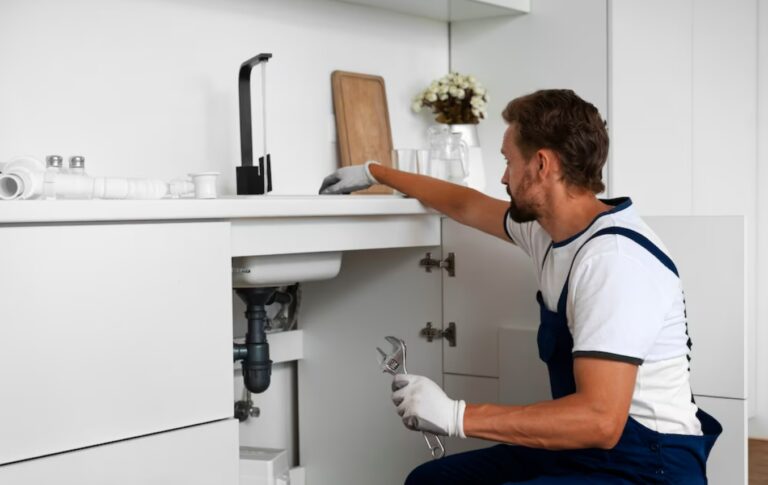Clogged drains are a common problem in households, causing inconvenience and potential damage. Understanding what causes these clogs can help prevent them, saving you time and stress down the line. Several factors contribute to drain blockages, each requiring specific preventative measures.
Hair and Soap Scum
Hair and soap scum are the primary causes of clogs in bathroom drains. When you wash your hair, strands inevitably fall out and travel down the drain. Over time, these strands collect and intertwine, forming dense clumps that obstruct water flow. Soap scum further complicates the issue by binding with the hair, creating a sticky residue that can harden.
To prevent clogged drains from hair and soap scum, try using a drain cover to catch hair before it goes down the drain. Regularly cleaning the drain cover will keep it effective. Additionally, rinsing the drain periodically with hot water can help dissolve any soap residue that may be starting to build up.
Here are some steps to prevent hair and soap scum clogs:
- Use a drain cover to catch hair.
- Clean the drain cover regularly.
- Rinse the drain with hot water to dissolve soap residue.
- Avoid using too much soap, as excess soap can increase buildup.
Taking these preventative measures can significantly reduce the chances of encountering severe clogs, keeping your bathroom drains clear and functional.
Food Waste and Grease
In kitchens, food waste and grease are the leading causes of clogged drains. Grease, in particular, poses a significant problem as it solidifies when cooled, sticking to the pipes and trapping food particles.
Grease should never be poured down the drain. Instead, let it cool and solidify in a container before disposing of it in the trash. Using a sink strainer can also help catch food particles, preventing them from slipping down the drain and causing blockages.
Follow these tips to prevent clogs from food waste and grease:
- Avoid pouring grease down the drain. Let it cool and dispose of it in the trash.
- Use a sink strainer to catch food particles.
- Dispose of food waste properly, either in the trash or through composting.
- Rinse dishes and utensils before washing them to remove excess grease and food particles.
By implementing these practices, you can maintain a clear and efficient drainage system in your kitchen. Regular awareness and proper disposal methods greatly reduce the risk of encountering clogged drains, ensuring smooth operation and minimizing the need for repairs.
Foreign Objects and Toys
Foreign objects and toys are unexpected sources of clogged drains, often encountered in households with young children. These items can accidentally find their way into the plumbing system and create significant blockages. Coins, small toys, and even bits of tissue or cotton swabs can get lodged in the pipes, disrupting water flow.
To prevent clogs caused by foreign objects, it’s important to keep small items away from sinks and drains. Educate children about the importance of keeping toys and other small objects out of the bathroom and kitchen areas. Using drain covers or stoppers can also act as a barrier, preventing objects from entering the pipes.
Here are some steps to mitigate clogs from foreign objects:
- Ensure small items are kept away from sinks and drains.
- Educate children about the dangers of flushing objects down the drain.
- Use drain covers or stoppers to catch foreign objects.
- Regularly inspect accessible pipes for any lodged items and remove them promptly.
Being attentive and taking these preventative measures can help maintain a clear drainage system, reducing the likelihood of blockages caused by foreign objects and toys.
Tree Roots and Outdoor Debris
Tree roots and outdoor debris can also lead to clogged drains. Tree roots are particularly invasive, as they seek out moisture and can penetrate even small cracks in your pipe system. Once inside, they grow and expand, causing severe blockages and even breaking the pipes.
Outdoor debris like leaves, dirt, and gravel can also enter the drainage system, especially if there are open or poorly covered drains. This accumulation can lead to significant clogs that are difficult to remove without professional intervention.
To prevent clogs from tree roots and outdoor debris:
- Regularly inspect outdoor drains and keep them covered.
- Trim tree roots and plant trees away from your plumbing system.
- Install barriers to prevent roots from accessing drain lines.
- Schedule regular professional inspections to identify and address potential issues.
Regular maintenance and preventive measures are key to avoiding these types of clogs. By staying proactive, you can ensure your outdoor drainage system stays clear and functional.
Conclusion
Understanding the common causes of clogged drains and taking preventative measures can save you from the inconvenience and expense of dealing with severe blockages. From managing hair and soap scum in the bathroom to properly disposing of food waste and grease in the kitchen, proactive steps can keep your drains flowing smoothly. Additionally, being vigilant about foreign objects and safeguarding your outdoor plumbing from tree roots and debris will further protect your drainage system.
With regular maintenance and attention to potential problem areas, you can reduce the risk of encountering clogged drains. Our skilled professionals at Power Pro Plumbing Heating & Air are always ready to help with any plumbing issues you may face.
If you’re dealing with a stubborn clogged drain or need an expert to assess your plumbing, contact us today. Our 24-hour plumber in Rancho Palos Verdes is here to ensure your drains stay clear and your home remains comfortable. Reach out to us now for reliable and professional assistance.










